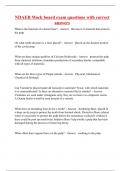Notas de lectura
Lectures Development and Health: Psychopathology - Psychology
- Grado
- Institución
Dit zijn mijn hoorcollege aantekeningen voor Development and Health. Het onderwerp is psychopathologie en super interessant! Met deze aantekeningen heb ik een 7 gehaald. Succes ;)
[Mostrar más]












